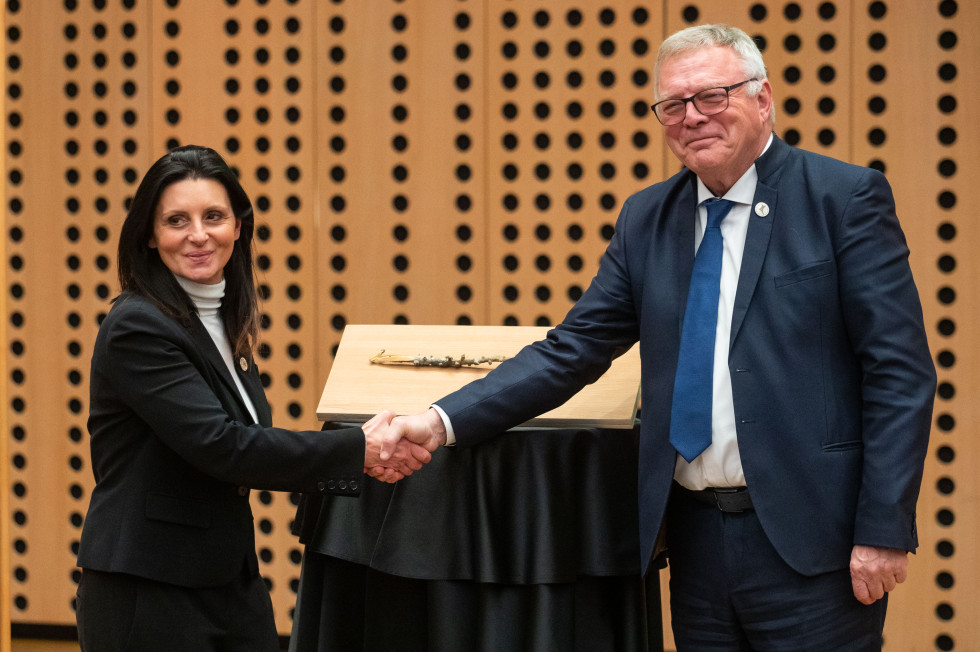XVIII Alpine Conference and conclusion of Slovenian Presidency of the Alpine Convention

Alpine Conference | Author STA/Boštjan Podlogar
At the press conference, Minister Novak presented the key messages of the Slovenian Presidency of the Alpine Convention 2023–2024. He highlighted that the Alps are confronted with many cross-border challenges, but also provide opportunities for cooperation in seeking solutions for preserving this unique area and its life.
"The Alpine Convention will continue to strive for sustainable economic, ecological and social development in the Alps and to contribute to the preservation and improvement of the quality of life by protecting, renovating and developing settlements, so that people can live and work in the Alps." Jože Novak, Minister
We must start living with the fact that climate change is here, with all the harsh consequences for people. We must accept that natural disasters are no longer occasional phenomena but a regular occurrence in our lives. "Therefore, we must invest in solutions that are based on nature and will strengthen our resilience," believes Novak. "The Alpine Convention is an excellent platform for learning from the experience of others to strengthen resilience to climate change. By disseminating the results of the Young Academics Award we will ensure the development of evidence-based solutions."
Minster Novak handed over the Presidency of the Alpine Convention to the Italian Deputy Minister for the Environment and Energy Security, Vannia Gava. She thanked the Slovenian team for two years of excellent work and for the reports that reflect this. According to Deputy Minister Gava, Italy has prepared a practical presidency programme for this unique – in terms of both culture and biodiversity – Alpine area. The Alps are certainly facing and will continue to face many challenges. Gava said that during its presidency, Italy will focus in particular on biodiversity, climate change, changing glaciers and the cultural aspect of people's lives in this area.
Gava and Novak both stressed the importance of educating young people and pointed out that we must include them in the preparation of all measures and promote international cooperation in this regard. "This involves transferring knowledge and values, as well as identifying the needs of young people in mountain areas, so that we can offer them prospects for living in the mountains," said Minister Novak.
At the Alpine Conference meeting, the contracting parties adopted three documents drawn up by Slovenia during its presidency:
- 10th Report on the State of the Alps focusing on the quality of life in the Alps, including recommendations for future work;
- Recommendations on climate change education in the Alps; and
- Strategic guidelines on biodiversity in the Alps.
The documents are the result of hard work in the entire Alpine region and of close cooperation with the contracting parties (the individual countries and the EU) and observers.
During its two-year presidency, Slovenia focused on three priority topics: quality of life as the main topic, environmental education with an emphasis on climate change and biodiversity. It achieved tangible results in these fields and contributed to the implementation of all three priorities of the Multi-Annual Work Programme of the Alpine Conference 2023–2030 (quality of life, climate change and biodiversity).
The event was attended, among others, by: Deputy Prime Minister of the Principality of Liechtenstein and Minister of Home Affairs, Economy and Environment Sabine Monauni; German Federal Minister for the Environment, Nature Conservation, Nuclear Safety and Consumer Protection Steffi Lemke; Italian Deputy Minister of the Environment and Energy Security Vannia Gava; French Member of Parliament Valérie Rossi; and Head of the Representation of the European Commission in Slovenia Jerneja Jug Jerše.

